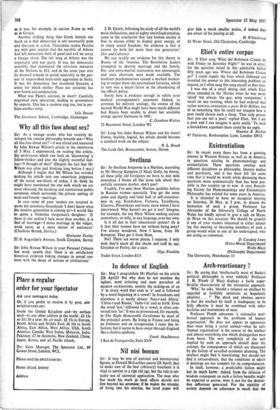Why all this fuss about sex?
Sir : As a teenage reader who has recently de- veloped the concise philosophy towards sex—'Why all this fuss about sex?'-1 was elated and reassured by John Rowan Wilson's article in the SPECTATOR of 5 May. I experienced, on reading this article, the exuberance which one feels on 'discovering' a fellow-thinker and also the slightly resentful feel- ing—'I thought of that!' (Despite the fact that Mr Nilson was alive and thinking long before I was.) Although I realise that Mr Wilson has avoided making his article into one censorious judgment of the social sex-rituals of today, I do think he might have mentioned the one with which we are most obsessed, the mocking and ostentatious public ceremony which surrounds the private uniting of male and female—marriage.
In case some of your readers are tempted to quote the notorious Grundyism 'I don't know what the modern generation is coming to'—I would like to quote a Victorian clergyman's daughter: 'If there is one notion I hate more than another, it is that of marriage—I mean marriage in the vulgar, weak sense, as a mere matter of sentiment.' (Charlotte Brontë, Shirley.) Marianne Puxley 72 St Augustine's Avenue, South Croydon, Surrey Sir: John Rowan Wilson in your Personal Column last week, asserts that 'there is no satisfactory historical evidence linking changes in sexual cus- toms with the decay of nations or civilisations.' J. D. Unwin, following his study of all the world's main civilisations, and of eighty uncivilised societies, came to the conclusion that 'any human society is free to choose either to display great energy, or to enjoy sexual freedom; the evidence is that it cannot do both for more than one generation.' (Sex and Culture.) We can readily see evidence for this theory in Russia of the 'twenties. The Revolution leaders attempted to destroy marriage and the family. Pre- and extra-marital intercourse was encouraged, and state abortions were made available. The resultant psychoneuroses caused a marked slacken- ing in output from the nationalised factories, which in turn was a major factor in the abandoning of the official policy.
Surely here is evidence enough to refute your medical correspondent's statement. Indeed, to continue his military analogy, the course of the Second World War might have been much different had Russia been unable to divert her available energy against Germany in 1941.






























 Previous page
Previous page